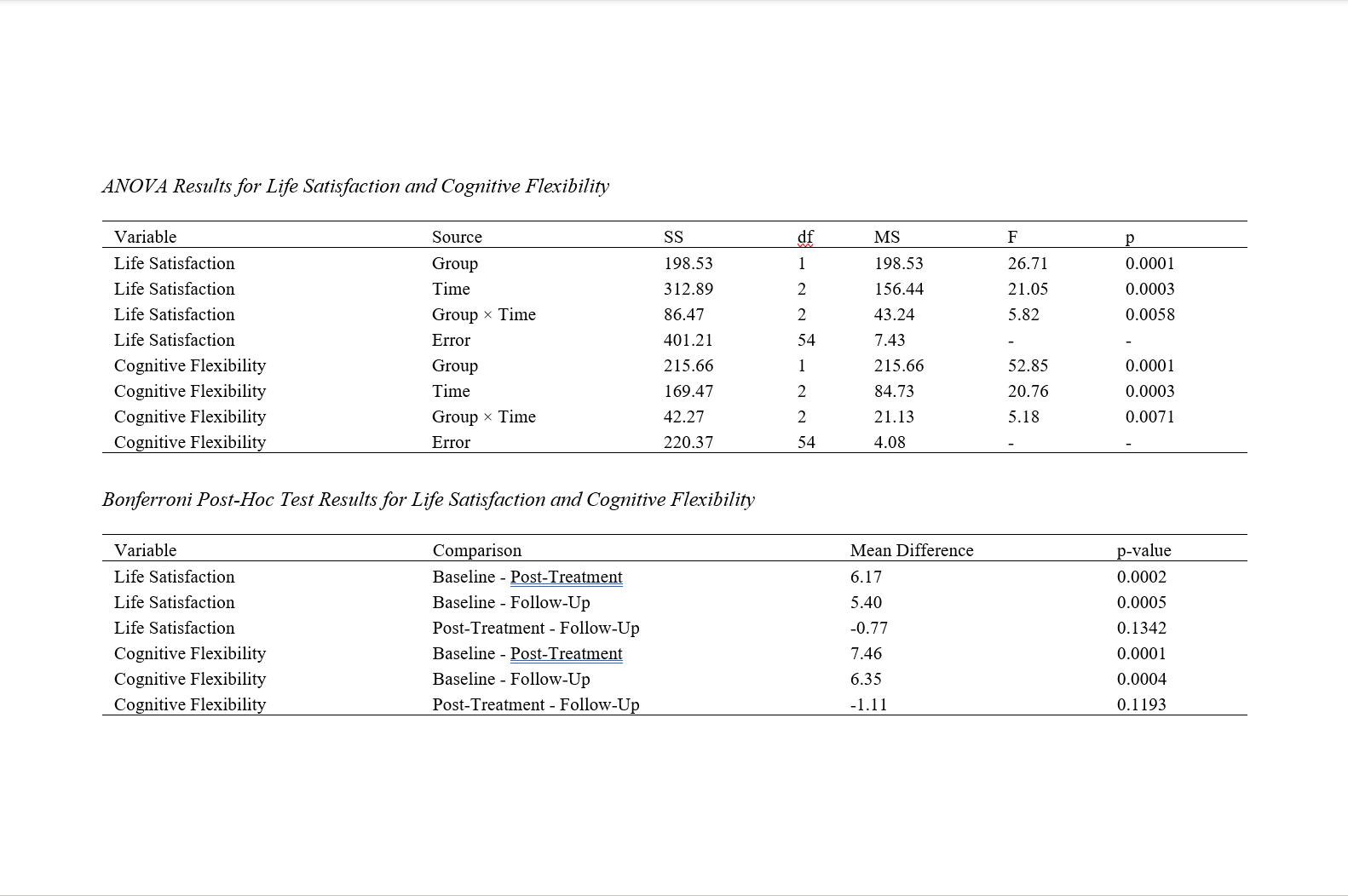Effectiveness of Exposure Therapy on Life Satisfaction and Cognitive Flexibility in Adults with ADHD
Keywords:
ADHD, exposure therapy, life satisfaction, cognitive flexibility, randomized controlled trial, psychological interventionAbstract
This study aimed to examine the effectiveness of exposure therapy in enhancing life satisfaction and cognitive flexibility in adults with ADHD. This study employed a randomized controlled trial design, with 30 adults diagnosed with ADHD randomly assigned to an experimental group (n = 15) receiving eight sessions of exposure therapy or a control group (n = 15) receiving no intervention. Life satisfaction and cognitive flexibility were assessed at baseline, post-treatment, and five-month follow-up using the Satisfaction with Life Scale (SWLS) and the Cognitive Flexibility Inventory (CFI), respectively. Data analysis was conducted using repeated-measures analysis of variance (ANOVA) to examine within- and between-group differences over time, with post-hoc pairwise comparisons performed using the Bonferroni adjustment. The results indicated a significant main effect of time and group, as well as a significant interaction effect between time and group for both life satisfaction and cognitive flexibility (p < 0.01). Post-hoc analyses showed that the experimental group demonstrated significant improvements in both variables from baseline to post-treatment (p < 0.001), with these gains maintained at follow-up. In contrast, the control group showed no significant changes over time. The findings suggest that exposure therapy effectively enhances life satisfaction and cognitive flexibility in adults with ADHD, with long-term benefits observed at follow-up. Exposure therapy appears to be a promising intervention for improving life satisfaction and cognitive flexibility in adults with ADHD. By reducing avoidance behaviors and promoting adaptive cognitive responses, this approach may help individuals with ADHD develop greater emotional and cognitive adaptability. The sustained benefits observed at follow-up suggest that exposure therapy may provide long-lasting improvements in quality of life for this population.
Downloads
References
Alami, S., Bakhtiarpour, S., Asgari, P., & Khorrami, N. S. (2020).Comparison of the Effectiveness of Existential Group Therapy With Cognitive-Behavioral Group Therapy on Increasing Life Satisfaction Among the Methadone Maintenance Patients.Ajnpp, 172-177.https://doi.org/10.32592/ajnpp.2020.7.3.105
Ando, M., Hashimoto, Y., Arima, H., Shirozu, M., Matsushima, J.,& Oda, H. (2024). Utility of Making Life History Book Using Digital Instruments in Reminiscence Therapy for Psychological-Wellbeing of Elders. Open Journal of Social Sciences, 12(01), 460-468.https://doi.org/10.4236/jss.2024.121031
Bangash, S. (2023). Exploring Emotional, Problem Focus and Dysfunctional Coping Strategies and Life Satisfaction Among Married and Unmarried Spinal Cord Injury Patients. Annals of Human and Social Sciences, 4(II).https://doi.org/10.35484/ahss.2023(4-ii)07
Blais, R. K. (2021). The Association of Exposure to Military Sexual Trauma and Romantic Relationship Satisfaction Among Partnered Men Service Members/Veterans: The Influence of Compulsive Sexual Behavior. Family Process, 60(4), 1295-1306.https://doi.org/10.1111/famp.12623
Ghorbani, E., Karami, A., Noormohammadi, F., & Khosravi babadi, A. a. (2021). A causal model of maladaptive schema based on cognitive flexibility and preferring coping strategies with the mediating role of emotional intelligence during home quarantine conditions caused by the Coronavirus pandemic.Applied Family Therapy Journal (AFTJ), 2(5), 246-274.https://journals.kmanpub.com/index.php/aftj/article/view/858
Hecker, L., King, S., Stapert, S., Geusgens, C., Hollander, M. d., Fleischeuer, B., & Heugten, C. v. (2024). Can Exposure Therapy Be Effective for Persistent Post-Concussion Symptoms? A Nonconcurrent Multiple Baseline Design Across 4 Cases. Journal of Head Trauma Rehabilitation.https://doi.org/10.1097/htr.0000000000001023
Hejazi, S., Jamshidi, M., Arani, A. M., Yoosefee, S., Abdoljabari,M., Heidari, M., & Farhoush, M. (2020). Comparison of the Effects of Islamic and Conventional Approaches to Hope Therapy on Self-Esteem and Life Satisfaction of Patients With Coronary Artery Disease. Health Spirituality and Medical Ethics, 7(3), 25-32. https://doi.org/10.52547/jhsme.7.3.25
Iwanowska, M., Zawadzka, A. M., & Kondratowicz, B. (2023). News Media Exposure and Life Satisfaction in the COVID-19 Pandemic: A Moderated Mediation Model of COVID-19 Fear and Worries and Gender. Current Issues in Personality Psychology.https://doi.org/10.5114/cipp/156172
Kaur, K., Asnaani, A., Levy, H. C., Miller, M. L., Tolin, D. F., & McLean, C. P. (2024). Moving Beyond Symptom Reduction: A Meta‐analysis on the Effect of Exposure Therapy for PTSD on Quality of Life. Journal of Clinical Psychology, 80(10),2134-2146. https://doi.org/10.1002/jclp.23727
Khan, M. J., Shakeel, F., Aslam, M. H., Bibi, N., Abid, R., Aziz,B., & Sardar, I. (2023). Celebrity-Persona and Its Effects on Self-Esteem and Life Satisfaction. Nust Journal of Social Sciences and Humannities, 9(1), 1-12.https://doi.org/10.51732/njssh.v9i1.164
Kim, J., & Park, G. R. (2024). Cumulative Exposure to Social Isolation and Longitudinal Changes in Life Satisfaction Among Older Adults. Society and Mental Health, 14(2), 113-128.https://doi.org/10.1177/21568693241232410
Lee, B. O., Yao, C. T., & Ramoo, V. (2022). An Evaluation of Improving Psychosocial Life Satisfaction Among Older Adults in Taiwan Day Care Centers Using Life Review Work.Journal of Applied Gerontology, 42(5), 842-851.https://doi.org/10.1177/07334648221141408
Lee, D. N., Gu, M., & Sok, S. (2024). Effects of Qigong Therapy on the Psychological Well-Being, Physical Health State, Sleep State, and Life Satisfaction of Older Adults Living in Community. Holistic Nursing Practice, 38(4), 186-193.https://doi.org/10.1097/hnp.0000000000000660
Li, H., Zhang, X., You, C., Chen, X., Cao, Y., & Zhang, G. (2021). Can Viewing Nature Through Windows Improve Isolated Living? A Pathway Analysis on Chinese Male Prisoners During the COVID-19 Epidemic. Frontiers in Psychiatry, 12.https://doi.org/10.3389/fpsyt.2021.720722
Parsaiezadeh, M., Shahbazimoghadam, M., Derakhshande, M., & Namjoo, M. (2024). Exploring the Predictive Relationship between Mental Toughness and Subjective Well-Being: A Quantitative Analysis. Journal of Personality and Psychosomatic Research (JPPR), 2(1), 29-35.https://doi.org/10.61838/kman.jppr.2.1.6
Parsakia, K., Knechtle, B., Irandoust, K., & Taheri, M. (2024).Strength-Based Therapy: Empowering Athletes' Self-Efficacy and Life Satisfaction. Hn, 2(2), 1-7.https://doi.org/10.61838/kman.hn.2.2.1
Rähse, T., Richter, M., & Knöchelmann, A. (2025). Continuing Exposure to Disadvantageous Material and Perceived Economic Factors on Self-Rated Health in Different Life Stages: fixed Effects Analyses With Data From the German Socioeconomic Panel. BMC public health, 25(1).https://doi.org/10.1186/s12889-024-21135-y
Sacchi, L., Merzhvynska, M., & Augsburger, M. (2020). Effects of Cumulative Trauma Load on Long-Term Trajectories of Life Satisfaction and Health in a Population-Based Study. BMC public health, 20(1).https://doi.org/10.1186/s12889-020-09663-9
Sok, S., Kim, S., Jeong, D. U., & Cho, Y. (2020). Effects of Yangsaeng (Health Management) Therapy for Korean Older Adults in Nursing Home. International journal of environmental research and public health, 17(20), 7507.https://doi.org/10.3390/ijerph17207507
Telles, S., Katare, N., Sharma, S. K., & Gupta, A. (2024). Perception of Illness and Life Satisfaction Following a Week of Yoga Therapy in Patients With Chronic Diseases. Indian Journal of Ancient Medicine and Yoga, 17(1), 9-12.https://doi.org/10.21088/ijamy.0974.6986.17124.2
Yao, C. T., & Lin, C. J. (2020). Efficacy of Life Review Therapy Intervention on Life Satisfaction Among Older Adults Living in Taiwan Nursing Homes. Innovation in Aging,4(Supplement_1), 382-382.https://doi.org/10.1093/geroni/igaa057.1230

Downloads
Additional Files
Published
Issue
Section
License

This work is licensed under a Creative Commons Attribution-NonCommercial 4.0 International License.















